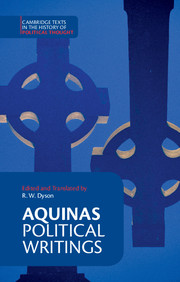Book contents
- Frontmatter
- Contents
- Preface
- Abbreviations
- Introduction
- A brief chronology of St Thomas's life
- Bibliography
- 1 Government and politics
- 2 Obedience
- 3 Law
- 4 Right, justice and judgment
- 5 Property relations
- 6 War, sedition and killing
- 7 Religion and politics
- Biographical glossary
- Index
- CAMBRIDGE TEXTS IN THE HISTORY OF POLITICAL THOUGHT
6 - War, sedition and killing
Published online by Cambridge University Press: 05 June 2012
- Frontmatter
- Contents
- Preface
- Abbreviations
- Introduction
- A brief chronology of St Thomas's life
- Bibliography
- 1 Government and politics
- 2 Obedience
- 3 Law
- 4 Right, justice and judgment
- 5 Property relations
- 6 War, sedition and killing
- 7 Religion and politics
- Biographical glossary
- Index
- CAMBRIDGE TEXTS IN THE HISTORY OF POLITICAL THOUGHT
Summary
Summa theologiae IIaIIae 40: On war
We come next to war; and here there are four things to consider:
Whether it is a sin to wage war
Whether it is lawful for clerics to fight
Whether it is lawful for those who wage war to make use of ambushes
Whether it is lawful to wage war on holy days
articulus 1: Whether it is always a sin to wage war
It seems that it is always a sin to wage war.
obiectio 1: For punishment is not inflicted for anything except sin. But those who wage war are threatened by the Lord with punishment, according to Matthew 26:52: ‘All that take the sword shall perish by the sword.’ Therefore all war is unlawful.
obiectio 2: Moreover, whatever is contrary to a Divine precept is a sin. But to wage war is contrary to a Divine precept, for it is said at Matthew 5:39: ‘But I say unto you, That ye resist not evil’, and at Romans 12:19: ‘Dearly beloved, avenge not yourselves, but rather give place unto wrath.’ Therefore to wage war is always a sin.
obiectio 3: Moreover, nothing is contrary to an act of virtue except sin. But war is contrary to peace. Therefore war is always a sin.
obiectio 4: Moreover, every kind of legitimate contest is lawful, as is clear in the case of contests of reason. But the martial contests which take place in tournaments are prohibited by the Church, for those who die in such events are deprived of ecclesiastical burial. Therefore it seems that war is a sin absolutely.
- Type
- Chapter
- Information
- Aquinas: Political Writings , pp. 239 - 266Publisher: Cambridge University PressPrint publication year: 2002
- 2
- Cited by



